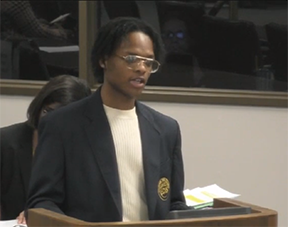• by Earl Williams • IDRA Newsletter • June-July 2020 •
 Editor’s note: When the Texas State Board of Education held hearings in November 2019 to consider adding a new high school African American Studies course to the state curriculum, students from Dallas ISD traveled to Austin to testify about their experience in a district-level African American Studies course. Subsequently, in April 2020, the board unanimously approved the course. The following is the text of one student’s testimony.
Editor’s note: When the Texas State Board of Education held hearings in November 2019 to consider adding a new high school African American Studies course to the state curriculum, students from Dallas ISD traveled to Austin to testify about their experience in a district-level African American Studies course. Subsequently, in April 2020, the board unanimously approved the course. The following is the text of one student’s testimony.
See the video of his testimony and others.
I would like to start by thanking you all for welcoming us here today and zoning in on the echoes of a minority group that often goes unheard.
Simply put, African American Studies should be implemented because societal barriers can only be broken down through education of the seemingly uneducated. And with the current climate of our society, this education is needed more than ever.
Maybe one day, the pain won’t feel the same. Me and my people won’t be lost in tears, dancing in this hurricane. Our blood won’t keep getting splattered on concrete as if it’s art for their eyes.
What a shame. It is 100-plus years later, and killing Black people is still a consensual crime.
For far too long, we’ve been told to move on with our lives, because we’re no longer shackled in chains. Naively, we blindly followed suit and believed in a conditioned lie of freedom that continues to be offered up by the white noise.
“What a shame. It is 100-plus years later, and killing Black people is still a consensual crime.”
For too many years, little Black boys and girls have been robbed of their beautiful history, only being taught the oppression, ensuring that the truth of their crimes is forever left a mystery.
When they teach you, the colonizers don’t mention the gallons of blood spilled and countless numbers of bodies that were wrongfully beaten until their tired souls gracefully floated up to freedom.
So, just know when you all weave together thoughts, spitting out syllables from your tongue, asking why this course is needed, you’re also asking why an entire race that built this country doesn’t deserve to be disgraced.
But hey, maybe one day the system won’t be the same. Me and my people won’t be paralyzed by their stare, frozen in this hurricane. Our image won’t keep being altered, making racial comments awkward. What a shame. It is 100-plus years later, and killing Black people is still a consensual crime.
But really, what do I know? I’m just a minority who is destined to end up behind bars with three or four kids without their father.
I have a brown soul living in a vessel that society treats so cold, destined to end up another name shouted at countless protests because, in America, the land of the free, my melanin makes me a walking target, a consequence of my lack of representation in a classroom that feeds the ignorance of the contrasting students who surround me.
Maybe one day the pain won’t feel the same. Me and my people won’t be lost in tears, dancing in this hurricane.
But for now, I’ll stand here today pleading my case. It’s far past overdo that the children of the world learn not only of the horrors, but also of my ancestors’ revolutionary breakthroughs, because they were more than secretive affairs or gateway stares.
Africa is more than little boys with dirty faces and girls who are checked off a list of America’s capitalistic databases. All of us here today before you are more than jail-bound statistics in our deemed distasteful yet glorified characteristics. And it is far past overdue that these sickening false narratives are debunked and ridiculed.
So, I ask you, as you continue painting a world with our blood, crafting each narrative to your advantage, and framing photos in our skin, tell me how much longer will you all sit up there on your comfortable high horses and let history repeat itself yet once again?
Earl Williams is a student at Trinidad Garza Early College High School in Dallas. See the video of Earl Williams presenting his testimony.
[©2020, IDRA. This article originally appeared in the June-July 2020 IDRA Newsletter by the Intercultural Development Research Association. Permission to reproduce this article is granted provided the article is reprinted in its entirety and proper credit is given to IDRA and the author.]



